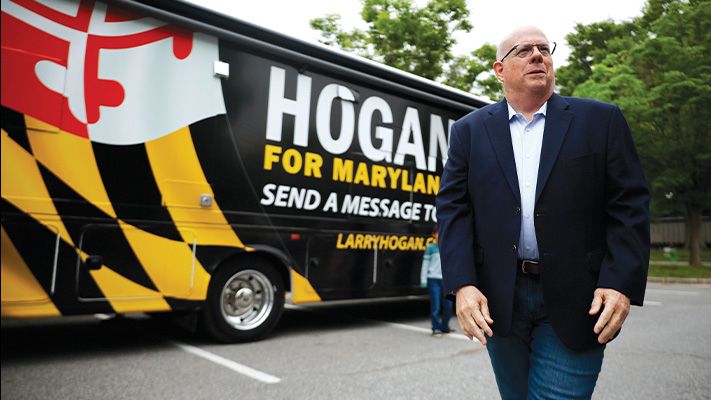
Maryland Republicans did something unusual recently. In nominating former Republican Gov. Larry Hogan for the Senate, they selected a candidate for federal office with a chance to win. Maryland, a liberal state with a large population of government employees, has not voted for a Republican for president since 1988. And Maryland has not had a GOP senator since the liberal Republican Charles Mathias retired in 1987.
For long-suffering Maryland Republicans like me, having Hogan as a candidate is like having your hard-luck sports team contend for a championship. In my two decades in Maryland, I’ve seen the great wheel of time turn. My children have gone through school. I have buried my parents. I’ve even seen the 17-year cycles of the cicadas twice. Yet in these 20-plus years in Maryland, I have never before had an opportunity to vote for a candidate for federal office who has had any chance to win in Maryland. Until now.

Living where I do as a Republican is an exercise in frustration. Montgomery County, where I live, is even more liberal than the state as a whole. Joe Biden won the county 78.6% to 19% in 2020. Montgomery County has never had a Republican council president in its history. Republicans have not had a majority on the council since Lyndon Johnson was president in the 1960s. The odds that I will in my lifetime get to vote for a Republican candidate for Congress with a chance to win are somewhere around winning the Powerball after being struck by lightning.
Usually, I have to find alternatives to winning as a way of getting political satisfaction. I flash my ID when I go to vote, only to have the election officials put up their hands like Dracula avoiding a cross. I proudly ask for a Republican ballot, which sometimes requires the election officials to scramble about to find one. And I check the returns after voting to see what percentage of the tiny number of Republicans my wife and I constituted at our local precinct.
This sorry record is why I’m so excited about the prospect of Gov. Larry Hogan becoming Sen. Larry Hogan. Hogan is not just a Republican but is a Ronald Reagan Republican. He served as an alternate delegate for the “Gipper” in 1976 and considers Reagan his political hero. He even voted for the late Reagan as a write-in candidate on his 2020 presidential ballot. Hogan is also a Trump critic, which should help him in a state where Biden is likely to win by 20 to 30 points in November.
Hogan’s opponent is Prince George’s County Executive Angela Alsobrooks, a 53-year-old black graduate of Duke University and the University of Maryland Francis King Carey School of Law. She has lower name identification than Hogan, but she will be a formidable opponent. In the primary, she defeated billionaire Rep. David Trone (D-MD), who spent an astounding $62 million of his own money. Alsobrooks spent almost $6 million of the $7.8 million she raised for the primaries in fending off Trone and will need to replenish her coffers. Hogan should be able to compete with her on this front. As one Hogan operative told me, Hogan “could not have outspent Trone. He can outraise her.”
One big issue is going to be abortion. This is the Democrats’ go-to topic these days, and it’s a potent one in deep-blue Maryland. But Hogan will not be an easy target. He has pledged to be in favor of abortion rights as a senator, which should blunt the issue somewhat.
Although Hogan will have to play defense on abortion, Alsobrooks has vulnerabilities as well, including on Israel. Even though Maryland has the fourth-highest percentage of Jews in the country — it’s almost 4% Jewish, with a total of 200,000 Jews in the state — Maryland’s other Democratic senator is Chris Van Hollen, an unrelenting critic of Israel. The Baltimore Jewish Times recently wrote, “We face the uncomfortable reality that Chris Van Hollen is not our friend.” Hogan, in contrast, is like most Republicans as a staunch Israel supporter, and he has promised to be a “pro-Israel champion” in the Senate. As for Alsobrooks, while she did distance herself somewhat from Van Hollen’s criticisms, she called for a suspension of arms to Israel if it entered Rafah. If she wins, it would likely mean that heavily Jewish Maryland has two Israel critics in the Senate instead of a pro-Israel counterbalance in the form of Hogan.
Another issue is crime. Hogan clearly thinks Alsobrooks is vulnerable here, touting both his support from the Prince George’s County Fraternal Order of Police and his “Refund the Police” initiative as governor. He also just released a 10-point crime plan that says that “we can no longer allow politics to get in the way of public safety.” He emphasizes his ability “to bring people in both parties together to get this done, support our law enforcement, and make our communities safer.”

Beyond the specific policies, the framing of the race is crucial. If the race is a referendum on Hogan’s gubernatorial tenure, then Hogan stands a good chance. On the other hand, if it’s about Republican or Democratic control of the Senate, then Alsobrooks has the edge. As a Maryland political donor with ties to both camps told me, the “balance of the Senate is a big issue — absent that he’d have a better shot.” Even here, though, Hogan has an opening. Alsobrooks’s likely fealty to the Senate Democratic leadership allows Hogan to stress his anti-Trump independence and his willingness to work across the aisle to get things done, something voters consistently profess to want in candidates. Hogan recognizes this and stressed in his first released ad of the general election campaign that “it’s time we stop the partisan BS and get stuff done.”
Hogan also doubled down on this by calling on the public to “respect” the Trump verdict, suggesting that he’s more concerned with picking up Democrats than with maximizing turnout among pro-Trump Republicans.
Hogan’s biggest advantage is his standing in Maryland. He had a remarkable 77% favorability rating toward the end of his tenure as governor. One GOP operative who is an expert in Senate races, and who previously tried to get Hogan to run, said that “Hogan was the most popular politician I’ve ever seen polled.” He added that Hogan has a rare reverse gender gap: Women like him more than men. Hogan proved as governor that he could handle a crisis, leading Maryland through COVID-19 and the 2015 Freddie Gray riots in Baltimore. He earned points through his dignified handling of his bout with non-Hodgkin lymphoma in 2015, which left him bald but also gave him a relatable, anti-charisma charm. He’s also a ferocious campaigner, and as the GOP operative told me, “Good candidates win tough races.”
CLICK HERE TO READ MORE FROM THE WASHINGTON EXAMINER
It will indeed be tough, though. Democratic pollster Mark Mellman said Maryland’s history shows that Hogan is facing an uphill battle. According to Mellman, “[Sen. Ben] Cardin won his last election by 35 points, Van Hollen by 32, Biden by 33, and Democrats won the statewide vote for U.S. House by 30 points. Those are very consistent and very large margins in federal elections.” On the other hand, Alsobrooks has never run statewide, which means that her inexperience could be a factor against the battle-tested Hogan.
Hogan may have another advantage as well, one that is harder to gauge. Republican Marylanders like me, who never get to support a Senate candidate with a chance, may show up in higher-than-usual numbers for the rare opportunity to vote for a possible winner.
Washington Examiner contributing writer Tevi Troy is a senior fellow at the Bipartisan Policy Center and former senior White House aide. He is the author of five books on the presidency, including the forthcoming The Power and the Money: The Epic Clashes Between Commanders in Chief and Titans of Industry.
Scroll down to leave a comment:
[Fancy_Facebook_Comments]







